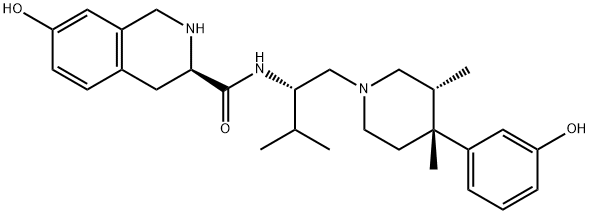Biological Activity
ki = 0.3 nmjdtic is a selective opioid kappa receptor antagonist.at least three opioid receptor subtypes, μ, δ, and κ, are responsible for the modulation of a diverse array of biological events from nociception to immune regulation. the baisi of studying this complex receptor system is for the identification of both agonists and antagonists with high degree of receptor subtype selectivity.
in vitro
jdtic demonstrated high affinity for the κ receptor in the binding assay and highly potent and selective κ antagonism in the [35s]gtp-γ-s assay. jdtic showed a 16-fold improvement in its κ receptor ki value in the functional assay relative to the binding assay. in the [35s]gtp-γ-s functional assay, jdtic demonstrated a 3.4-fold increase in κ antagonist potency relative to the functional assay utilizing guinea pig membranes [1].
in vivo
jdtic was found to be able to dose-dependently block acute nicotineinduced antinociception in the tail-flick but not the hotplate test and did not attenuate morphine's antinociceptive effect significantly in either test. moreover, jdtic failed to block the expression of nicotine reward as measured by the conditioned place preference model. in contrast, jdtic attenuated the expression of both physical and affective nicotine withdrawal signs in mice[2].
References
[1] thomas jb,atkinson rn,rothman rb,fix se,mascarella sw,vinson na,xu h,dersch cm,lu y,cantrell be,zimmerman dm,carroll fi. identification of the first trans-(3r,4r)- dimethyl-4-(3-hydroxyphenyl)piperidine derivative to possess highly potent and selective opioid kappa receptor antagonist activity. j med chem.2001 aug 16;44(17):2687-90.
[2] jackson kj,carroll fi,negus ss,damaj mi. effect of the selective kappa-opioid receptor antagonist jdtic on nicotine antinociception, reward, and withdrawal in the mouse. psychopharmacology (berl).2010 jun;210(2):285-94.

